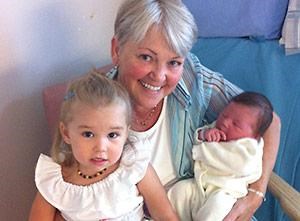Debbie Hooper is in Vancouver this week to attend a lung transplant clinic and a support group meeting. Earlier in August, the recent second-time grandmother was in the city for a pulmonary function test and CT scan.
Hooper has chronic asthma and COPD (chronic obstructive pulmonary disease). Doctors believe that her grandfather and his siblings had the same disease. It skipped a generation, however, and none of her siblings have it.
She developed the disease in 1998 after two bad bouts of pneumonia six months apart. She was hospitalized for 11 days the first time and 13 days the next. “Since then, it has been a steady decline.”
The term for her condition is air-trapping. She does not need oxygen and doesn’t look sick. She breathes air in but cannot breathe it out. During medical tests, she has to work to force air out of her lungs.
“My lungs have turned into mush bags,” says Hooper who had 27 per cent lung capacity. With medication, which she takes every day, and ventilation, it rises to 35 per cent. Currently, as an experiment, she is taking a drug used on people with cystic fibrosis in an attempt to dry up any secretions in her lungs, which normally would cause an infection.
Hooper is a patient of Dr. John Yee, head of the BC Lung Transplant Division at Vancouver General Hospital. She received her pager on April 7. It had to be replaced because it was faulty. Weekly test calls are done, at different times, to ensure the pager is working properly.
Hooper says there are 28 people in the BC lung transplant program. Even though people may be recommended for a double lung transplant, they could end up with a single transplant.
She believes she is 16th in the Blood Type O category for a double lung transplant. A lot of criteria are used to determine placement on the list. “Because I’m functioning and not critical,” Hooper explained, “there are people ahead of me. Once you are on a pager, a call could come tomorrow or it could come in two years.”
Hooper stopped going to the family cabin up Powell Lake because of the pager but she just recently found it does work there.
Hooper avoids sick people and works at staying healthy. “The first question people on the transplant list are asked when organs become available is ‘are you healthy.’”
Since acquiring the disease, Hooper has conducted her own research and “I’ve learned an awful lot.” She has joined various groups of other people who are in the same medical situation through websites such as transplantfriends.com. “I’m in touch with a woman in Philadelphia who is the same age as me and has two grandbabies,” said Hooper. “Both she and her brother had to have double lung transplants.”
She follows the progress of other double-lung transplant recipients, including Helena Campbell, a Canadian who became well known after a video appearance on the Ellen DeGeneres television show. Even after a transplant, patients are constantly watched for rejection or other problems and must take anti-rejection medication for the rest of their lives.
Hooper knows of three other people in Powell River who have had a double-lung transplant. “That is amazing for a small town.”
The world’s first lung transplant was performed in Toronto in 1983. Even though there have been significant advances since the first transplant, there are still major problems to be solved. The demand for acceptable lungs has risen constantly over the years, yet the supply of acceptable donor organs has remained almost unchanged. The pool of available lungs is being expanded by a process called ex vivo lung perfusion, a cold preservation process that increases the time for transporting lungs from four hours to up to 25 hours. This is important when trying to match a donor and recipient who may live long distances from each other.
Hooper encourages people to sign up for organ donation at www.transplant.bc.ca.
“One person can give the gift of life to several others,” explained Hooper, adding that kidneys, livers, lungs, hearts, eyes and tissue are all possible organ donations that could help up to a dozen people on transplant lists. “But potential donor families are in a terrible time of their lives, grieving the sudden loss of a loved one.”
She knows in order for her or others to receive a transplant, there will be a family that is devastated.
“One of the things that helps ease that devastation, I’m told, is knowing that the gift of donated organs is helping another person to continue living. There are not enough words to say thank you for that gift.”



